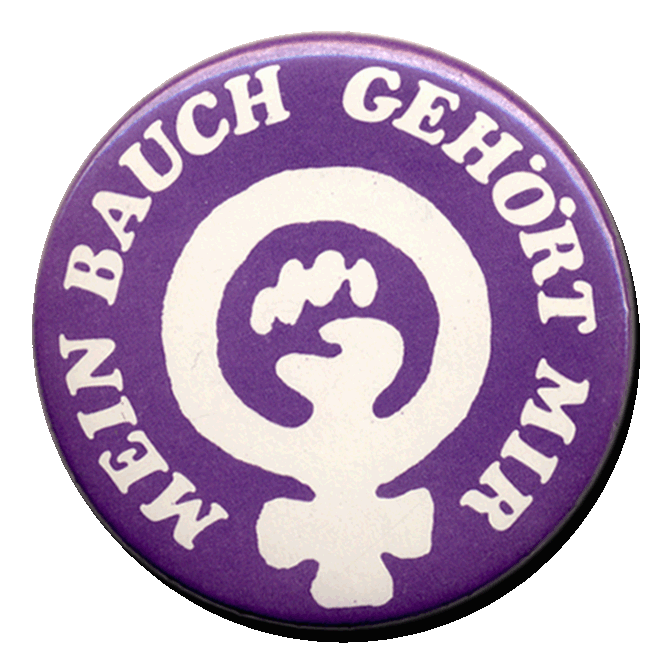The fight against the abortion ban is the trigger of the women’s movement throughout Western Europe. Women in West Germany are the last among them, when starting their revolt in the spring of 1971.
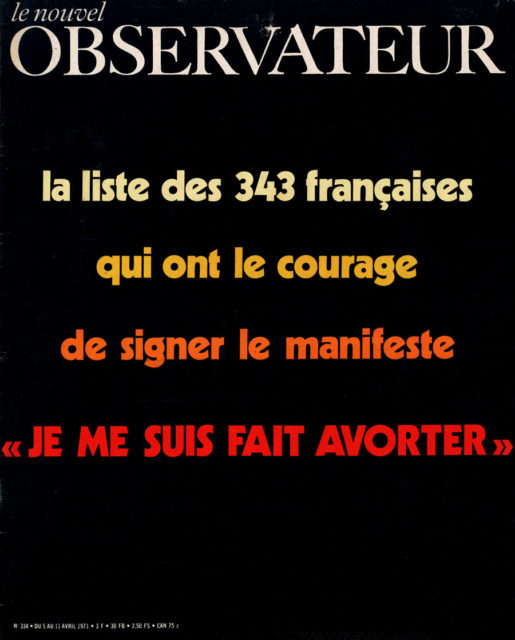
April 5, 1971
The French weekly Nouvel Observateur publishes the manifesto of the 343. 343 French women confessing: „Je me suis fait avorter“ – I had an abortion. Among the signatories are Simone de Beauvoir, Marguerite Duras, Francoise Sagan and Jeanne Moreau. Initiators of the campaign are the Féministes Révolutionaires of the Mouvement de Libération des Femmes (MLF).
April / May 1971
Editors of the women’s magazine Brigitte complain in an article on the „wave of international emancipation“ that “German women do not burn their bras and wedding dresses. There are no ’sisters of the Lilith‘ as in America, not even ‚Dolle Minnas‘ with wit like in Holland. There is no militant magazine, there are no wild pamphlets, no significant, seditious book. There is no anger.“ All of which is about to change soon.
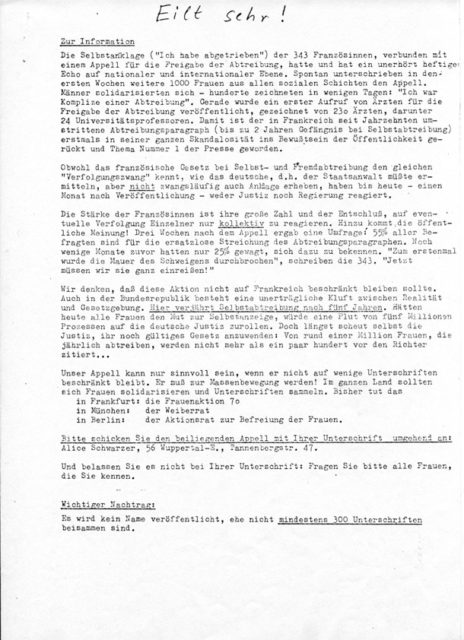
Alice Schwarzer, who at the time is a correspondent in Paris and one of the initiators of the MLF Manifesto, exports the French women’s campaign to Germany. The journalist manages to convince the editors of the magazine Stern to publish of a German equivalent. But Schwarzer finds only three groups of women who want to support the campaign against § 218 [of the German penal code]: The Frankfurt based Frauenaktion 70 (politically close to SPD and FDP), a part of the socialist Rote Frauen from Munich and the Sozialistischer Frauenbund Berlin. After some hesitation the Frankfurter Weiberrat also decides to participate, although the members initially consider the campaign to be „petty-bourgeois and reformist“. Most self-incriminating signatures are collected by individual dedicated women.
June 6, 1971
The magazine Stern titles with 28 women who confess: „We all had an abortion!“ – including Senta Berger and Romy Schneider.

A total of 374 women have signed the appeal, declaring, „I am against § 218 but for planned children!“ The Stern publication turns out to become a national scandal within days – and triggers an avalanche. Women are no longer silent. They talk about their fear of unwanted pregnancies. About their abortions. About sexuality. And about violence. They talk everywhere: in offices and factories, in neighborhoods and universities.
In Dusseldorf the first meeting of delegates of „all groups fighting against § 218“ takes place. Women from seven cities participate. Self-incrimination and solidarity signatures continue to be collected. The 218 women’s groups are slowly turning into a network that covers the whole of Germany.
The Frauenaktion 70 from Frankfurt, a group of „socialist and liberal“ women, had already put the fight against § 218 on the agenda in 1970, but the effect did not reach far. Now, the Frankfurt women participate actively in the fight against §218.

June 22, 1971
At six o’clock in the morning the police stormed the apartments of the § 218 activists Edda Albrecht-Wagner and Ute Geissler in Munich. The Munich group is the nation’s most active and provocative one among the § 218 groups. The police officers seize around 2,000 solidarity statements and 150 self-incriminations. – At the beginning of July, the Essen police are also searching the rooms of the Aktion 218. Here, too, the public prosecutor’s office is looking for lists of self-incriminations.

July 10, 1971
The second delegates meeting of the Aktion 218 takes place in Frankfurt/M. This time almost 100 women from 20 cities take part. They count 2,345 self-incriminations of women, 973 of men and over 86,000 solidarity statements. In a letter of protest to Federal Minister of Justice Jahn (SPD) they state: „The 218-campaign and its far-reaching success are proof that women no longer see the state imposed compulsion to give birth in case of unwanted pregnancies as their individual problem. For the first time, we demand that we are not treated as voting cattle. We want to articulate ourselves as active political citizens.
July 19, 1971
30 delegates of the Action 218 presented the 86,000 solidarity statements to the Federal Ministry of Justice.
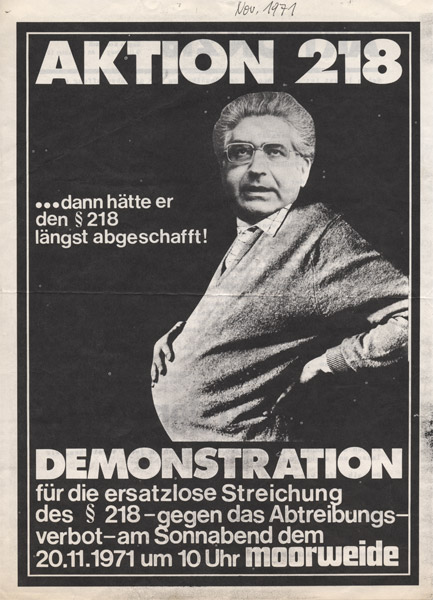
August 15, 1971
In a Berlin cinema the filmmaker Rosa von Praunheim shows his film It is not the homosexual who is perverse, but the society he lives in. The film, which Praunheim had produced on behalf of the WDR and which was broadcast in several television programs, will be an important impulse for the German homosexual movement.
September 2, 1971
Federal Minister of Justice Jahn (SPD) announces a reform of §218. However, the Minister opts for the so-called Indikationslösung [indication model]: A termination of pregnancy should only be possible with „medical-social“, „ethical“ or „eugenic“ indication, that is: At risk for the mother’s life, after rape or in case of disability of the fetus. The Fristenlösung, a model demanded by SPD women and the coalition partner FDP, which grants the unconditional right to have an abortion within the first three months of pregnancy, is rejected by Jahn.
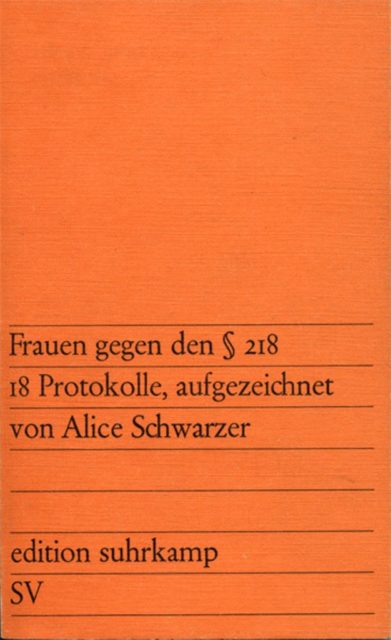
Alice Schwarzer, who as of June ‘71 – like many of her committed colleagues – is no longer supposed to write on abortion in the media, published her first book: Women Against § 218. In interviews with 18 women, she documents the existential impact of the abortion ban on women’s lives. – As it is typical of the Zeitgeist of such collective political work, Schwarzer included a collectively written text by the Sozialistischen Arbeitsgruppe zur Befreiung der Frau – Aktion 218, Munich. The editorial collective of six women analyzed therein the political function of the then exactly 100 years old § 218. (Already in the Historical Women’s Movement, the deletion of § 218 was a central demand. (See also: Minna Cauer: Menschlich oder juristisch?) In her epilogue Alice Schwarzer describes the zeitgeist, the course of the action and the reactions of politics, the medical profession and the churches.
October 9-10, 1971
At the third national meeting of the Aktion 218, the participants decide to call for demonstrations in all major cities in order to put pressure on the SPD / FDP government, which seems to be closer to the Vatican than to women.
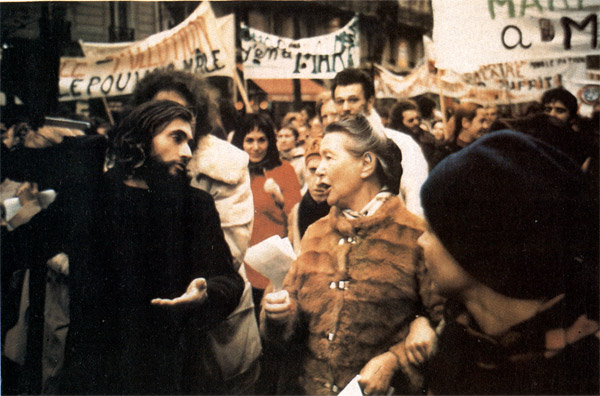
November 6, 1971
In many German cities and in almost all Western European countries, women are demonstrating for women’s right to abortion and self-determination. – In Paris, more than 2,000 women take to the streets, including – for the first time alongside the young women’s movement – Simone de Beauvoir, the author of The Second Sex, which becomes the theoretical foundation of the new feminism. Beauvoir rejects the priority of the class struggle (main contradiction) and focuses on the gender struggle (secondary contradiction) instead.
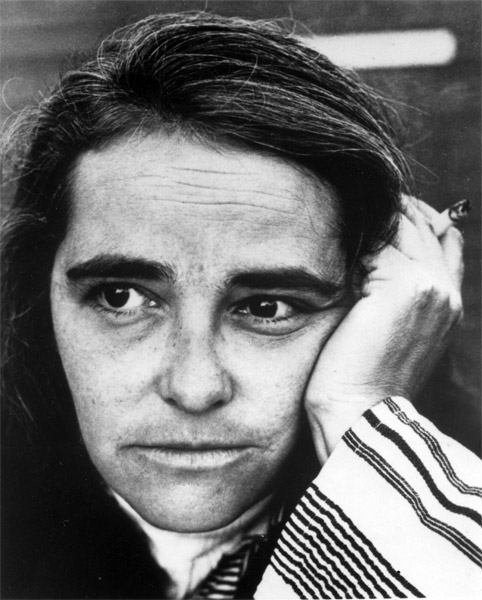
The book Sexual Politics by the American feminist Kate Millett appears in German translation (Sexus und Herrschaft). In the analysis – her PhD thesis – Millett focuses on two aspects: the function of sexual politics and the inner shackles of women: „As women in patriarchy are for the most part marginal citizens when they are citizens at all, their situation is like that of other minorities […] social sciences literature confirms the presence in women of the expected traits of minority status: group self-hatred and self-rejection, a contempt both for herself and for her fellows.“- As early as 1849 the suffragette Louise Dittmar declared in her essay On the nature of marriage‘: „Wife, marriage and love wear the slave’s mark.


